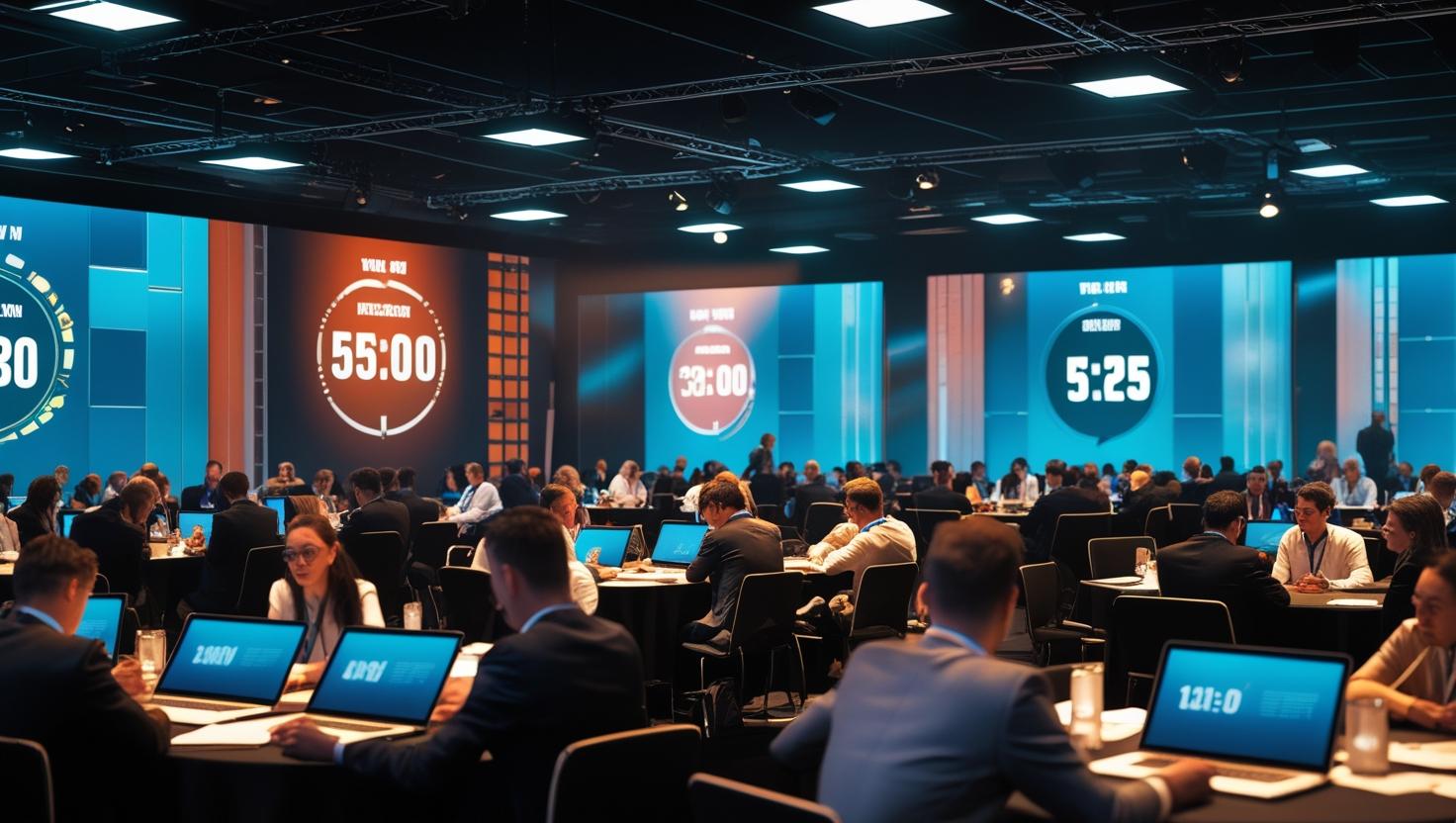Leveraging Countdown Timers for Breakout Sessions and Networking Rooms

Breakout sessions and networking rooms have become essential in the architecture of modern hybrid and virtual events. These smaller, focused spaces allow for deeper discussions, lead nurturing, spontaneous collaboration, and peer-to-peer learning. But without structure, they can spiral off-schedule, causing delays across your agenda.
Using a countdown timer for sessions and networking spaces introduces the right balance of structure and flexibility. It ensures your attendees enjoy meaningful conversations within a planned window — without overrunning the next session or panel.
This blog explores how platforms like Let’s Time IT allow you to schedule, automate, and discreetly manage countdown timers across breakout sessions and networking lounges — including how to use remote-controlled countdown timers and embed timers directly into webinar platforms.
The Challenge with Unstructured Networking and Breakout Timing
In a traditional physical event, a bell or voice-over would announce the end of a breakout. In virtual and hybrid settings, you’re juggling:
- Multiple simultaneous rooms
- Speakers in different time zones
- Attendees jumping between sessions
- Real-time interaction via video, chat, or polls
Without clear visual cues, breakouts often overrun or feel abruptly cut short. That’s where tools like a stagetimer or countdown overlays help — by creating visual consistency and alerting both moderators and attendees of upcoming transitions.
How Countdown Timers Enhance the Breakout Experience
Here’s what happens when you implement countdown timers for events within breakout and networking spaces:
Keeps Every Room Aligned with the Main Agenda
Rooms can wrap up simultaneously, even if they started at slightly different times.
Enhances User Experience
Attendees are informed of remaining time, encouraging more focused interactions.
Reduces Moderator Stress
Moderators don’t have to verbally manage the clock — the timer does it for them.
Encourages Session Hopping
When timers are synced, attendees can confidently move between sessions.
Use Cases: Where Countdown Timers Deliver Maximum Value
Virtual Roundtables
Use timers to cap each participant’s speaking time and signal transitions.
Speed Networking
Display a timer that counts down each interaction, prompting smooth rotations.
Breakout Brainstorming
Guide teams through stages (Ideation → Discussion → Conclusion) using segmented timers.
Exhibit Booths & Sponsor Lounges
Keep sponsor presentations concise with a visible timer for presenters.
Each use case benefits from conference timer precision without disrupting the fluid nature of small-group formats.
How Let’s Time IT Powers Breakout Timers at Scale
Let’s Time IT offers a browser-based, discreet way to manage and display timers across all formats — whether your breakout is in Zoom, Airmeet, or on a physical stage. The platform allows:
- Flexible scheduling for parallel sessions
- Remote-controlled countdown timers managed by backstage teams
- Browser-share timers for each room or group
- Real-time alerts for speakers and moderators
- Custom design and branding to match the event theme
What’s more, Let’s Time IT allows you to add countdown timers to addevent workflows, so registrants see a timer on confirmation pages, email reminders, or digital wallets.
Step-by-Step: How to Set Up Timers for Breakouts Using Let’s Time IT
Step 1: Creating an Event Timer
- Log in to Let’s Time IT
- Navigate to the “Create” section
- Enter the Campaign Title, Campaign Description, and set the Expiry Date
Create one timer per breakout or networking room if sessions are concurrent.
Step 2: Syncing Timers with Speaker or Room Schedules
- Assign timers to breakout moderators, hosts, or group leaders
- Set automated pre-session reminders to help speakers prepare
- Enable staggered timings for rotating networking rounds
This keeps each session or group aligned with your overall run-of-show.
Step 3: Enabling Discreet Countdown Displays
- Share browser-based links with moderators for screen-sharing
- Use backstage monitors for in-person breakouts
- Deliver private countdown alerts to speakers in real time
Discreet displays ensure attendees stay engaged while moderators stay on track.
Step 4: Adjusting Timers Remotely
- Use the real-time dashboard to pause, skip, or extend any timer
- Dynamically adjust for delays or overperformance
- Switch between multiple active breakout rooms
This is where the remote-controlled countdown timer becomes essential. You can react without disruption.
Integrating Countdown Timers with “Add to Calendar” Campaigns
Using countdown timers within add to event campaigns improves session attendance and punctuality. When attendees click your “Add to Calendar” button, they can also:
- Receive session-specific countdowns in emails or landing pages
- View timer overlays during waiting rooms or pre-session lobbies
- Get mobile reminders timed to session start
This approach connects countdown timer for addevent integrations directly to user action and schedule adherence.
Best Practices for Managing Breakout Timers
- Segment Your Timers: Use different durations for activities within each session
- Train Moderators: Make sure they understand how to use and interpret timers
- Standardize Display Across Rooms: Maintain consistency in visuals and format
- Use Timer as a Cue, Not a Constraint: It should guide the flow, not interrupt it
By applying these practices, your countdown timer for sessions becomes a core engagement tool.
Final Thoughts: Make Every Breakout Room Count
Breakout sessions and networking rooms often define the attendee experience. With the right tools, you can balance free-form discussion with time discipline—without losing energy or momentum.
Let’s Time IT helps you structure these sessions with precision, flexibility, and discretion—giving speakers and attendees the clarity they need to connect meaningfully.
Ready to Power Smarter Breakouts?
Start your free trial with Let’s Time IT and gain control over every room, every timer, every session — all in real-time.